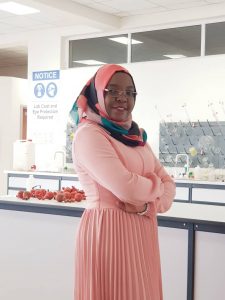Halima Twabi is the first Malawian researcher to win the L’Oreal -UNESCO for Science award in Sub-Sahara Africa.
Twabi is among 20 young innovative talents who have been successful in the 11th Edition of the joint initiative.
In this exclusive interview, Bright Malenga is talking to Halima Twabi.
Bright Malenga: Who is Halima Twabi?
Halima Twabi: My name is Halima Twabi and I am a Biostatistician by profession. I am currently a Lecturer in Statistics at Chancellor College.
Bright Malenga: Tell me your academic background?
Halima Twabi: I did my primary education at Jamia Islamia Primary School, then I joined Assalam Girls Secondary School where I sat for my Malawi School Certificate of Education (MSCE) and Alhamdulillah I was selected to pursue a Bachelor of Science at Chancellor College.
After obtaining my Bachelors in 2012, I was given a position as an associate lecturer at Chancellor College under the department of Mathematical Sciences. I then did my Masters in Biostatistics and became a full lecturer in 2016. I am currently doing my PhD in Biostatistics under the supervision of Professor Manda of the South Africa Medial Research Council and Professor Dylan Small of the University of Pennsylvania.
Bright Malenga: You have been successful in the L’Oreal- UNESCO in Science in Sub-Sahara Africa initiative, I need to know the details of the whole initiative.
Halima Twabi: Since the creation of the For Women in Science Sub-Saharan Africa regional program in 2010, L’Oréal and UNESCO have highlighted 159 outstanding women scientists, including 11 Laureates of the For Women in Science International Awards and 134 Young Talents at the doctoral and post-doctoral levels. Since 2019, South Africa also has a specific program supporting 7 young women researchers (5 PhD students and 2 post-doctorates) each year.
Alexandra Palt, Executive Vice-President of the Fondation L’Oréal, says: “The need for research by Africans for Africa has never been greater to address the challenges facing the continent. To overcome the current crisis, Africa’s research sector must accelerate its transformation by becoming even more digitally connected and empowering young women who wish to pursue scientific careers.”
It is estimated that over 875 million students worldwide have been affected by the COVID-19-related school closures, with the majority in Sub-Saharan Africa1. Only 2.4% of the world’s researchers are African scientists, 31% of whom are women too.
The 2020 Young Talents come from 16 countries and embody all of the potential of African science through their backgrounds and research subjects. For the first time this year, young women scientists from Congo and Malawi have been rewarded.
The jury of the 2020 Sub-Saharan Africa Young Talents Awards, chaired by Professor Nelson Torto, Executive Director of the African Academy of Sciences, selected these 20 Young Talents from nearly 330 applications. They all have in common the excellence of their projects and the desire to contribute to fuelling innovation in Africa. They are joining the community of 3,400 women researchers around the world who have been supported by the For Women in Science program since its creation in 1998.
Bright Malenga: As a researcher, may you explain your centres of research?
Halima Twabi: My research involves developing and applying statistical methodology to explore and understand various attributes of social and health problems faced in Sub-Saharan Africa, particularly Malawi and to provide concrete evidence on the effectiveness of interventions on improving such problems. The research purpose provides reliable and accurate evidence to policy makers to address problems that we face within our country and globally.
Bright Malenga: How did you take part and what opportunities will the win bring to you and the country at large?
Halima Twabi: I had tried to apply for this award in 2017 and 2018, but due to some circumstances, I did not manage to complete the application. This year, I was determined Alhamdulillah to finalise the application and give it a try. With the help of my supervisors Prof Manda and Prof Small, I was able to secure all necessary documents and develop a strong research proposal for the application.
The research grant provides an opportunity to do my PhD research work effectively, this will in turn ensure that the ground-breaking research that I develop can be disseminated to drive policy making in the country, resulting in decision-making contributed through robust evidence.
Bright Malenga: What was your secret?
Halima Twabi: There were no specific secrets to be successful for this award. The passion to share my research work and the determination to complete an application with the help of my supervisor is what got me this award.
Bright Malenga: What was your work that made you to be successful in this initiative?
Halima Twabi: My research work that I put forward for the application was related to maternal and child health.
The work involved assessing the impact of interventions in curbing adverse multiple child health outcomes such as child under-nutrition which includes stunting, underweight and wasting, and investigating the impact maternal HIV infection on multiple adverse pregnancy outcomes in a prevention of mother to child HIV transmission (PMTCT) context, using advanced statistical methods
Bright Malenga: What are your advices to other young researchers who need to follow in your footsteps?
Halima Twabi: My advice to my fellow young researchers is that once such opportunities come your way, please apply. These help us broaden our networks and expose us to new collaborations. As researchers we should be eager to share our work as it encourages fellow researchers, particularly women scientists to do more and be known.
There are a good number of women doing scientific research in Malawi but there work is rarely exposed and appreciated. So let us ensure that we find platforms to showcase our research work and drive policy in the country.
Feedback; malengabright@gmail.com.





















